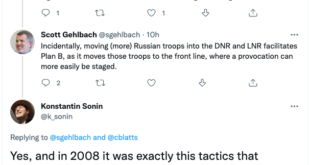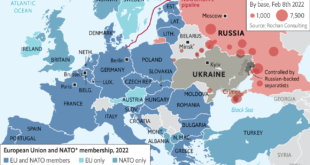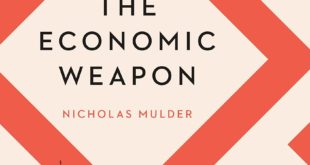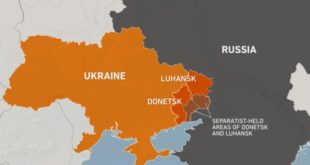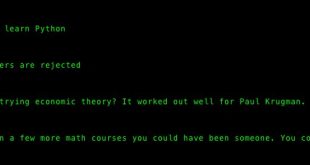Some lessons from the last war seem relevant for the current one. What I’ve been reading: …The Taliban in 2002 were broken. After fleeing Kandahar, Mullah Omar hid out in northern Helmand, Uruzgan, and Zabul. A new direction for the movement had yet to coalesce. Various commanders were preparing to continue the war, a few in al-Qa‘eda and militant camps in Pakistan. Others were resting in Pakistan or attempting to retire to community life inside Afghanistan. A number wanted to cooperate with...
Read More »A coherent and (mostly) strategic explanation for war in Eastern Europe emerges?
Yesterday Russia moved to consolidate its control over eastern separatist regions of Ukraine. People bickered over whether this constituted an invasion, at which point Noah Smith won Twitter for the day: If it’s not from the Invasion region of southern France, then it’s not an invasion, it’s just a sparkling annexation — Noah Smith ?+?=? (@Noahpinion) February 22, 2022 I’m only medium-good at tweets, and I don’t have much experience at all with Russia or Ukraine. But what I can do is parse...
Read More »When we focus on Russian aggression and motives, are we asking the wrong questions?
Here’s a thought experiment I think it’s useful to perform. Start by assuming that Ukrainians and NATO could make invasion painful for Russia, but that Russia has the military forces to overwhelm Ukraine, the foreign reserves to survive sanctions, and the resolve to invade despite these costs and risks, should Putin not get what he wants. If you take these assumptions as true, then I think you’re forced to conclude that there will be peace if Ukraine and NATO more or less capitulates, and...
Read More »The most worrisome thing I’ve read on Russia
A few weeks ago I explained why I thought a Russian invasion of Ukraine was unlikely. Last week I said rumors of another American civil war are exaggerated. That’s when my colleague Konstantin Sonin tweeted something unexpected, connecting the two: My @HarrisPolicy colleague @cblatts has an excellent piece on prospects of a new civil war in the U.S. I wish Kremlin had read this some time ago – you wouldn’t believe to what extent they rely on the idea that the U.S. is on the brink of a civil...
Read More »The invention of sanctions
The Biden administration is relying on the promise of harsh economic penalties to avert a Russian invasion of Ukraine. That’s just one of the instances where it’s wielding those tools. When were modern economic sanctions invented? In the aftermath of World War I, is one answer. Yesterday Adam Tooze reviewed a new history of this tool, The Economic Weapon, by Nicholas Mulder. Fighting was ruinous. But here was a multinational instrument, still painful to wield, but better than most of the...
Read More »The most useful things on Russia-Ukraine I’ve read
Russia is a strategic petrostate in a double sense. It is too big a part of global energy markets to permit Iran-style sanctions against Russian energy sales. Russia accounts for about 40 percent of Europe’s gas imports. Comprehensive sanctions would be too destabilizing to global energy markets and that would blow back on the United States in a significant way. China could not stand by and allow it to happen. Furthermore, Moscow, unlike some major oil and gas exporters, has proven capable...
Read More »War in Ukraine seems unlikely but, for the US and Europe, peace will taste bitter
If more U.S.-Russia talks are to happen, what should be on the table? Thomas Graham and Rajan Menon, writing in Politico Magazine, attempt to thread the needle of Russia’s Ukraine demands by considering a moratorium on the country’s future NATO membership amid a larger security compromise. “Now is the time to think big and imagine a new, more durable order, one that can encompass Russia,” they write. Others go further, with Anatol Lieven, writing in the Quincy Institute for Responsible...
Read More »Bound to Fail: The Rise and Fall of the Liberal International Order — John J. Mearsheimer
AbstractThe liberal international order, erected after the Cold War, was crumbling by 2019. It was flawed from the start and thus destined to fail. The spread of liberal democracy around the globe—essential for building that order—faced strong resistance because of nationalism, which emphasizes self-determination. Some targeted states also resisted U.S. efforts to promote liberal democracy for security-related reasons. Additionally, problems arose because a liberal order calls for states to...
Read More »Fareed Zakaria Woke Up? — Andrei Martyanov
Blowing a lead.Reminiscence of the FutureFareed Zakaria Woke Up? Andrei MartyanovSee alsoCheckpoint AsiaTrump Has Lost All Leverage With Iran Marko Marjanović Also at CATrump Remembers He’s the President, Tells Bolton, Pompeo to Dial It Back on Iran Erin Banco China’s State Media Tells Us It Picked the ‘Wrong Rival at the Wrong Time’ Teddy Ng
Read More »IPA’s weekly links
Guest Post by Jeff Mosenkis of Innovations for Poverty Action Hope everybody’s off to a great new year, and good luck to all the job candidates interviewing at ASSA. Also, remember from the last links that Ben Casselman, who’s been co-reporting on sexual harassment in economics for the New York Times, is there and happy to meet confidentially with anybody who wants to tell him about their experience. If you’re not on twitter, feel free to email me and I’ll put you in touch with him...
Read More » Heterodox
Heterodox


